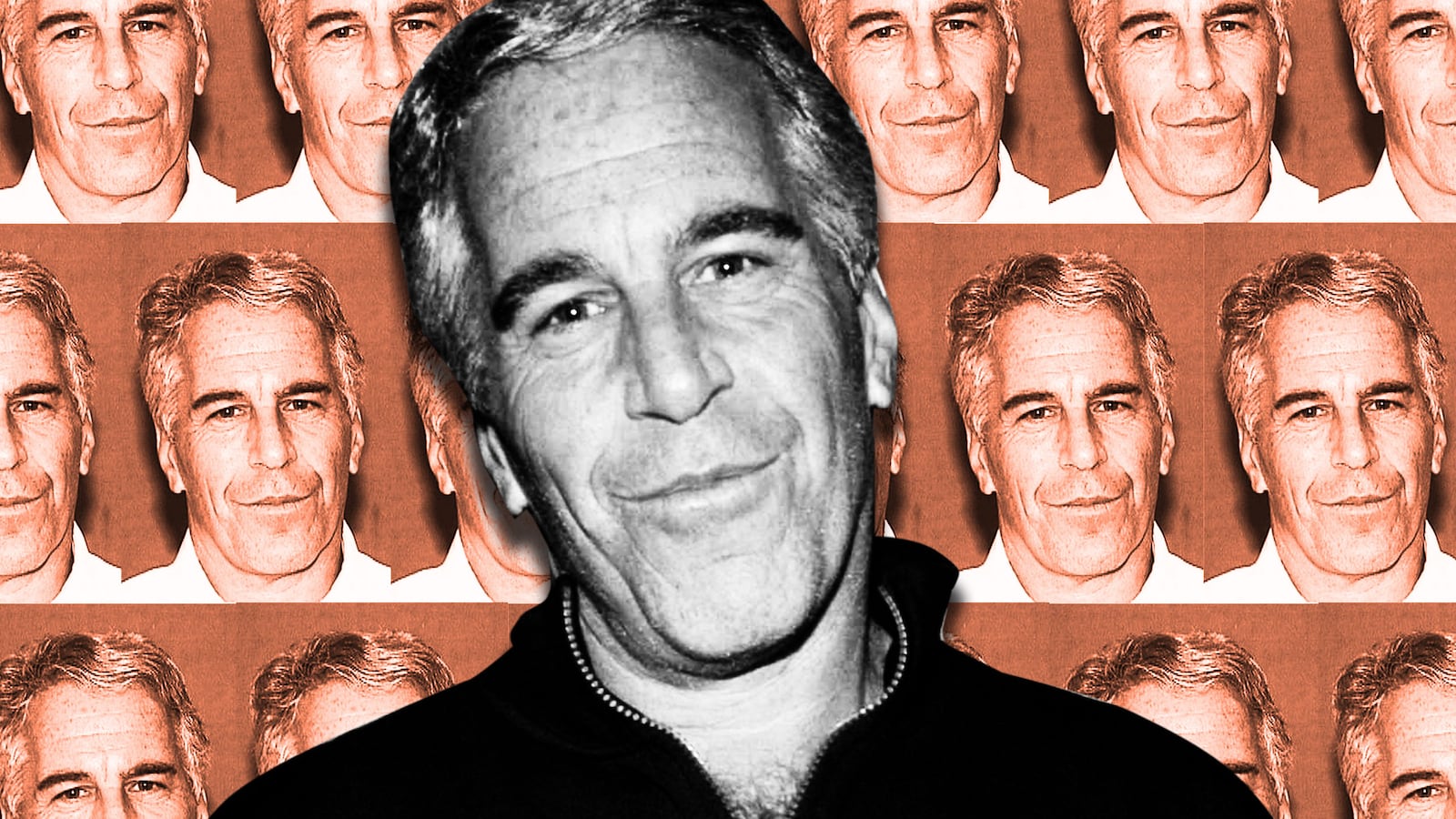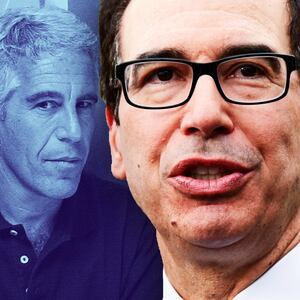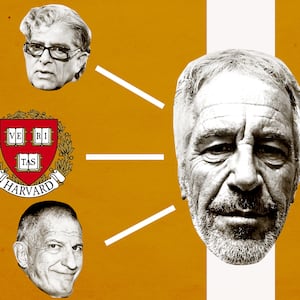A federal judge refused to scrap the controversial plea deal that granted immunity to Jeffrey Epstein and his co-conspirators, seven months after ruling that it had violated the Crime Victims' Rights Act.
Earlier this year, U.S. District Judge Kenneth A. Marra ruled that the U.S. Attorney’s Office in Miami under Alexander Acosta—who later became President Trump's labor secretary—broke the law in 2007 when it devised Epstein’s secret sweetheart deal without notifying victims. The ruling was seen as a huge victory for Jane Does 1 and 2, who sued the government in 2008, alleging the deal violated the Crime Victims’ Rights Act by keeping them in the dark on the negotiations with Epstein.
But in his ruling on Monday, Marra rejected most of the victims' requests for remedies, including their demand that the government turn over FBI records related to the Epstein investigation and strike the immunity provision for Epstein's alleged co-conspirators.
Four women were singled out for immunity in the 2007 plea deal—in addition to other potential unnamed accomplices—after victims identified them as recruiters who allegedly helped procure underage girls for the financier's pleasure. The women were identified in the document as “including but not limited to Sarah Kellen, Adriana Ross, Lesley Groff, or Nadia Marcinkova."
The plea deal gained national attention in July after Epstein’s arrest in New York, where he was charged with sex trafficking and one count of sex-trafficking conspiracy by Manhattan federal prosecutors. He pleaded not guilty and his lawyers continued to fight to uphold the 2007 plea deal in Florida, arguing that the New York case was an improper "do-over" of the Florida charges.
But Epstein's death in August by apparent jailhouse suicide upended the New York investigation, even as prosecutors vowed to continue digging into Epstein's underage sex trafficking ring.
On Monday, Marra denied Jane Does' request to rescind the plea deal's immunity provisions from Epstein’s alleged accomplices. He stated that the co-conspirators were not involved in active litigation and were non-parties to the case against the government. "The question of the validity of the non-prosecution provisions of the NPA as they relate to the alleged co-conspirators will have to be litigated with their participation if any prosecution against them is ever brought," he wrote. "Any decision by this Court on that question is meaningless without their participation in this proceeding."
The judge also denied the victims' request for FBI files related to the 2008 investigation into Epstein and his alleged co-conspirators, stating that, "it is also a matter of public knowledge that there is an ongoing investigation by the Department of Justice relative those individuals. The FBI’s documents, to the extent they were not otherwise protected by attorney/client or work product privileges, in all likelihood, are relevant to that ongoing investigation."
Additionally, Marra denied the request for a hearing for the victims with Acosta present, stating the former U.S. Attorney is now a “private citizen.” He also rejected awarding attorneys’ fees to the victims or forcing the government to pay for damages associated with their decade-long fight. Despite the mounting legal bill, Marra said that Florida prosecutors did not act in bad faith during the deal and therefore should not have to monetarily compensate Jane Does 1 and 2.
Marra concluded his opinion Monday by hoping the women "may take solace, however, in the fact that this litigation has brought national attention to the Crime Victims’ Rights Act and the importance of victims in the criminal justice system.”
Highlighting that importance, Marra did order the government to comply with the women’s request for “training for employees in the U.S. Attorney’s office for the Southern District of Florida about the CVRA." Prosecutors are expected to immediately begin training on the proper treatment of crime victims. The victims were also granted their request to meet with U.S. attorneys and the Department of Justice to discuss the decision to resolve the Epstein case.
“[The case] has also resulted in the United States Department of Justice acknowledging its shortcomings in dealing with crime victims, and its promise to better train its prosecutors regarding the rights of victims under the CVRA in the future,” the judge wrote, adding the rulings “rendered during the course of this litigation likely played some role, however small it may have been, in the initiation of criminal charges against Mr. Epstein in the Southern District of New York.”
When Epstein was arrested in New York, the charges were a grim echo of what he faced in 2007, when he was accused of sexually abusing dozens of minor girls.
Palm Beach police launched their investigation in March 2005, when a 14-year-old girl reported that a man named “Jeff” molested her at his home on El Brillo Way. The girl said she was introduced to Epstein by one of his recruiters, Haley Robson. (“Haley offers these girls a way to make fast cash. The man starts with a massage. If he likes them, he keeps them around and does more,” an early police report stated.)
Epstein allegedly procured his alleged victims through a “pyramid abuse scheme,” as one victims’ attorney called it in civil court filings, by paying the girls $200 to $300 in cash for each new underage victim they brought to his lair. The teens made $200 to $300, and sometimes up to $1,000, for giving the massages, which in some cases led to rape, according to court documents.
Ultimately, Epstein was accused of sexually assaulting more than 40 minor girls at his Palm Beach mansion after hiring them to give him “massages.” Police say that during these encounters, Epstein forced the girls to undress before he molested them. In some instances, Epstein allegedly had sex with the girls or ordered them to have sex with one of his co-conspirators, a young woman he described as his Yugoslavian “sex slave.”
In 2006, local cops asked the FBI to look into allegations that Epstein and his crew of personal assistants used the facilities of interstate commerce to coerce girls ages 14 to 17 into illicit sexual activity. By May 2007, the U.S. Attorney’s Office had drafted an 82-page prosecution memo and 53-page indictment against Epstein.
But Epstein’s all-star legal team quickly got in touch with prosecutors and penned lengthy letters arguing he committed no federal crimes. They also tried to discredit the girls by supplying dossiers on their MySpace pages, which allegedly indicated drug use and other unsavory behavior, and supposed run-ins with police.
“While we have never intended to and do not here seek gratuitously to cast aspersions on any of the witnesses ... we have been constrained to point out the fact that the alleged victims chose to present themselves to the world through MySpace profiles with self-selected monikers such as ‘Pimp Juice,’” stated one February 2007 letter, signed by Epstein lawyer Gerald Lefcourt.
Lefcourt argued the state attorney in Palm Beach had taken Epstein’s case to a grand jury, rather than filing charges, because the victims “have serious credibility problems, including damaging histories of lies, illegal drug use and crime.”
In a July 2007 letter, Lefcourt and fellow Epstein lawyer Alan Dershowitz touted Epstein’s philanthropic endeavors, including his relationship with former President Bill Clinton, with whom Epstein traveled to Africa to address the AIDS crisis. They also claimed Epstein “was part of the original group that conceived the Clinton Global Initiative.”
In September 2007, Epstein’s lawyers and prosecutors collaborated to find a lesser criminal charge to which Epstein could plead guilty. As part of the NPA signed on Sept. 24, 2007, Epstein agreed to plead guilty to the two misdemeanors in state court.
The NPA granted immunity to Epstein’s co-conspirators and included provisions ensuring it would be secreted from the public.
As the months passed, Jane Doe 1 and Jane Doe 2 believed the feds were still pursuing their case. In January 2008, the FBI sent out victim notification letters informing the women their “case is currently under investigation” and “this can be a lengthy process and we request your continued patience while we conduct a thorough investigation.” Another victim, Jane Doe 5, received a similar letter in May 2008.
Brad Edwards, an attorney for the Jane Does, contacted the U.S. Attorney’s Office to discuss the possibility of federal charges against Epstein. That June, Edwards “was led to believe federal charges could still be filed, with no mention whatsoever of the existence of the NPA or any other possible resolution to the case,” Judge Marra’s February ruling noted.
On June 30, 2008, Epstein entered his plea in state court. Instead of pursuing federal charges of sex trafficking of children, which could have landed Epstein in prison for decades, prosecutors allowed him to plead guilty to two minor state charges of solicitation of prostitution and procurement of minors for prostitution.
Jane Doe 1 filed an emergency petition to enforce her rights under the Crime Victims’ Rights Act on July 7, 2008. The victims didn’t receive a copy of the NPA until Aug. 28, 2008.
“Particularly problematic was the Government’s decision to conceal the existence of the NPA and mislead the victims to believe that federal prosecution was still a possibility,” Judge Marra wrote in his February order declaring the NPA illegal.
“When the Government gives information to victims, it cannot be misleading. While the Government spent untold hours negotiating the terms and implications of the NPA with Epstein’s attorneys, scant information was shared with victims. Instead, the victims were told to be ‘patient’ while the investigation proceeded.”
Meanwhile, Epstein served 13 months of an 18-month prison sentence (much of it on a cushy work leave, during which time he allegedly continued to abuse young girls), then paid settlements to several victims, and became a registered sex offender.
In one January 2015 declaration, Jane Doe 1 stated that Epstein molested her dozens of times from 2002 to 2005 at his Palm Beach home.
“If I had been told about a non-prosecution agreement, I would have objected,” Jane Doe said. “Criminal prosecution of Epstein for crimes against me was extremely important to me. I wanted to be consulted by the prosecutors before any resolution.”
During the FBI’s investigation of Epstein, Jane Doe said, the billionaire’s investigators trailed her and harassed her but she continued to cooperate with authorities.
“I wanted to cooperate in the prosecution more than anything else in my life; I was scared of Epstein; I was scared of what he had done to me and others, and of how he was continuing to harass me, and also what he could do to me and others,” Jane Doe stated.
She said Epstein “should be treated the same as other defendants with less money and connections are treated for these crimes.”
After Marra ruled in February of this year that the plea deal violated the CVRA, the government argued the court should “give victims a voice in the criminal justice process, but not decision-making authority over prosecution decisions.” Rescinding the non-prosecution agreement, they claimed, would risk “unintended harm to the victims” who wished to remain private and not participate in any new investigation.
“There are instances when victims of a crime or third parties may disagree with a prosecutor’s decision, but that decision nevertheless remains with the prosecutor and her supervisors, and this discretion is expressly preserved in the CVRA,” wrote Byung J. Pak, U.S. Attorney for the Northern District of Georgia, which represents the government in the Jane Doe case. Pak was nominated by President Trump in 2017.
In his ruling on Monday, Marra largely agreed with the government's recommendations.









